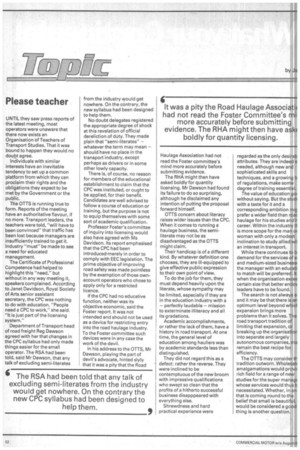Please teacher
Page 42

If you've noticed an error in this article please click here to report it so we can fix it.
UNTIL they saw press reports of the latest meeting, most operators were unaware that there now exists an Organisation of Teachers of Transport Studies. That it was bound to happen they would no doubt agree.
Individuals with similar interests have an inevitable tendency to set up a common platform from which they can proclaim their rights and the obligations they expect to be met by the Government or the public.
The OTTS is running true to form. Reports of the meeting have an authoritative flavour, if no more. Transport leaders, the teachers were told, "will have to been convinced" that traffic has been lost because managers are insufficiently trained to get it. Industry "must" be made to see a need for educated management.
The Certificate of Professional Competence had helped to highlight this "need," but without in any way meeting it, speakers complained. According to Janet Davidson, Royal Society of Arts senior assistant secretary, the CPC was nothing to do with education. "People need a CPC to work," she said. "It is just part of the licensing system."
Department of Transport head of road freight Reg Dawson agreed with her that changes in the CPC syllabus had only made things easier for the small operator. The RSA had been told, said Mr Dawson, that any talk of excluding semi-literates from the industry would get nowhere. On the contrary, the new syllabus had been designed to help them.
No doubt delegates registered the appropriate degree of shock at this revelation of official dereliction of duty. They made plain that "semi-literates" — whatever the term may mean — should have no place in the transport industry, except perhaps as drivers or in some other lowly capacity.
There is, of course, no reason for members of the educational establishment to claim that the CPC was instituted, or ought to be applied, for their benefit. Candidates are well advised to follow a course of education or training, but the purpose is not to equip themselves with some sort of academic qualification.
Professor Foster's committee of inquiry into licensing would also have agreed with Ms Davidson. Its report emphasised that the CPC had been introduced merely in order to comply with EEC legislation. The prime objective of improving road safety was made pointless by the exemption of those ownaccount operators who chose to apply only for a restricted licence.
If the CPC had no educative function, neither was its objective economic, said the Foster report. It was not intended and should not be used as a device for restricting entry into the road haulage industry. To the Foster committee such devices were in any case the work of the devil.
In his address to the OTTS, Mr Dawson, playing the part of devil's advocate, hinted slyly that it was a pity that the Road Haulage Association had not read the Foster committee's mind more accurately before submitting evidence.
The RHA might then have asked boldly for quantity licensing. Mr Dawson had found its failure to do so surprising, although he disclaimed any intention of putting the proposal forward himself.
OTTS concern about literacy raises wider issues than the CPC. When it comes to running a haulage business, the semiliterate may not be as disadvantaged as the OTTS might claim.
Their handicap is of a different kind. By whatever definition one chooses, they are ill-equipped to give effective public expression to their own point of view.
To do the job for them, they must depend heavily upon the literate, whose sympathy may be limited, especially if they are in the education industry with a — perfectly laudable — mission to exterminate illiteracy and all its gradations.
Academic accomplishments, or rather the lack of them, have a history in road transport. At one time, the general level of education among hauliers was by academic standards less than distinguished.
They did not regard this as a defect: rather the reverse. They were inclined to be contemptuous of the new broom with impressive qualifications who swept so clean that the profits of a hitherto successful business disapppeared with everything else.
Shrewdness and hard practical experience were regarded as the only desirab attributes. They are indeed s needed, although new and sophisticated skills and techniques, and a growing b of regulations, make some degree of training essential.
The value of education go+ without saying. But the stud with a taste for it and a corresponding ambition miE prefer a wider field than roac haulage for his studies and Icareer. Within the industry ti is more scope for the man or woman with only a modest inclination to study allied wi1 an interest in transport.
While there continues to b demand for the services of si and medium-sized business' the manager with an educati to match will be preferred. It when the organisation exceE certain size that better endov leaders have to be found.
The search is not always e and it may be that there is an optimum level beyond whict expansion brings more problems than it solves. The road transport tradition of limiting that expansion, or breaking up the organisation into separate and largely autonomous companies, ma remain the best recipe for efficiency.
The OTTS may consider th tradition outworn. Wholesali amalgamations would provit rich field for a range of new studies for the super manag( whose services would thus b necessitated. Whether, in an that is coming round to the belief that small is beautiful, would be considered a good thing is another question.














































